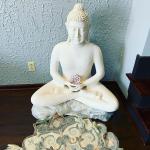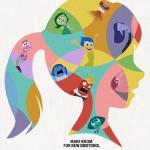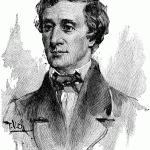Last night, in a Dharma study group I attend at the local FWBO center, we read and discussed the Canki (pronounced “chunky” like peanut butter) Sutta. What follows is a lengthy but rewarding (I do think) review of the sutta and its meaning for contemporary Buddhists.
The sutta describes a conversation between the Buddha and a very learned young Brahmin on the nature of knowledge: how does one come to know the truth?
The Brahmin, Baradvaja, asserts that it is through his faith in the sacred texts, the Vedas, and the tradition of Brahmins that one can know the truth. But the Buddha shows that each may be in error and thus cannot be trusted in themselves.
“Bharadvaja, first you went by conviction. Now you speak of unbroken tradition. There are five things that can turn out in two ways in the here-&-now. Which five? Conviction, liking, unbroken tradition, reasoning by analogy, & an agreement through pondering views. These are the five things that can turn out in two ways in the here-&-now. Now some things are firmly held in conviction and yet vain, empty, & false… [and so on]” (from accesstoinsight)
‘‘Pubbeva kho tvaṃ, bhāradvāja, saddhaṃ agamāsi, anussavaṃ idāni vadesi. Pañca kho ime, bhāradvāja, dhammā diṭṭheva dhamme dvedhā vipākā. Katame pañca? Saddhā, ruci, anussavo, ākāraparivitakko, diṭṭhinijjhānakkhanti – ime kho, bhāradvāja, pañca dhammā diṭṭheva dhamme dvedhā vipākā…. (from 428 here)
Five unfounded paths to knowledge:
- Saddhā: Conviction – or faith (this alone can obviously lead us astray)
- Ruci: Liking – ideas or beliefs we take pleasure in
- Anussavo: Unbroken Tradition
- Ākāraparivitakko: Reasoning by analogy, thought, consideration, etc.
- Diṭṭhinijjhānakkhanti: an agreement through pondering in views (diṭṭhi); or “delighting in mere speculation” – as one person at the group mused, “oh, like philosophers?” (which brought a scowl to my forehead and a smile to my mouth)
The Buddha goes on to prescribe a path to the discovery of truth:
- Find a teacher – investigate him/her: “in regard to states based on greed, … hatred, … delusion.”
lobhanīyesu dhammesu, dosanīyesu dhammesu, mohanīyesu dhammesu. (430)
Does this teacher, in times of greed (or attraction, lust, strong desire, etc) distort the truth, claim knowledge of the unknown, or stir up similar states in your mind? The same goes for aversion/hatred, and delusion (uncertainty, unclarity). As an aside, that same person wisely noted that she had never met a teacher who seemed perfectly free of distortions based on at least one of these. In humility we ought merely find a teacher with as little distortion as possible, taking to heart that it’s still probably less distortion than we ourselves have.
- Once we have carefully seen that the teacher has at least a relatively low degree of lobha,, dosa, and moha, the Buddha prescribes the following action (broken up by me):
“When, on observing that the monk is purified with regard to [these] qualities, he
- places conviction in him. With the arising of conviction, he
- visits him & grows close to him. Growing close to him, he
- lends ear. Lending ear, he
- hears the Dhamma. Hearing the Dhamma, he
- remembers it. Remembering it, he
- penetrates the meaning of those dhammas. Penetrating the meaning, he
- comes to an agreement through pondering those dhammas. There being an agreement through pondering those dhammas,
- desire arises. With the arising of desire, he
- becomes willing. Willing, he
- contemplates (lit: “weighs,” “compares”). Contemplating, he
- makes an exertion. Exerting himself, he both
- realizes the ultimate meaning of the truth with his body and
- sees by penetrating it with discernment. (from accesstoinsight)
“To this extent, Bharadvaja, there is an awakening to the truth. To this extent one awakens to the truth. I describe this as an awakening to the truth. But it is not yet the final attainment of the truth.
In the Pāli (my numbering/bolding):
‘‘Yato naṃ samannesamāno visuddhaṃ mohanīyehi dhammehi samanupassati ; atha tamhi (3) saddhaṃ niveseti, saddhājāto (4a) upasaṅkamati, upasaṅkamanto (4b) payirupāsati, payirupāsanto (5) sotaṃ odahati, ohitasoto (6) dhammaṃ suṇāti, sutvā dhammaṃ (7) dhāreti, dhatānaṃ [dhāritānaṃ (ka.)] dhammānaṃ (8) atthaṃ upaparikkhati, atthaṃ upaparikkhato (9) dhammā nijjhānaṃ khamanti, dhammanijjhānakkhantiyā sati (10) chando jāyati, chandajāto (11) ussahati, ussahitvā (12) tuleti, tulayitvā (13) padahati, pahitatto (14) samāno kāyena ceva paramasaccaṃ sacchikaroti paññāya ca (15) naṃ ativijjha passati. Ettāvatā kho, bhāradvāja, saccānubodho hoti, ettāvatā saccamanubujjhati, ettāvatā ca mayaṃ saccānubodhaṃ paññapema; na tveva tāva saccānuppatti hotī’’ti. (432)
The Buddha says this is how the truth (sacca) is discovered. But this is not the end of the journey. To finally arrive at truth, one goes on to,
“The cultivation, development, & pursuit of those very same qualities: to this extent, Bharadvaja, there is the final attainment of the truth. To this extent one finally attains the truth. I describe this as the final attainment of the truth.” (ibid.)
‘‘Tesaṃye , bhāradvāja, dhammānaṃ āsevanā bhāvanā bahulīkammaṃ saccānuppatti hoti. Ettāvatā kho, bhāradvāja, saccānuppatti hoti, ettāvatā saccamanupāpuṇāti, ettāvatā ca mayaṃ saccānuppattiṃ paññapemā’’ti. (433)
Thus we have our directions for finding and arriving at truth: 1) good teacher, 2) learning and pondering a bunch, and 3) continued cultivation, development, and pursuit. This jives well with some readings in Zen I’ve done lately, which say there is no static state of ‘enlightenment’ but rather an ongoing process. Awakening is a verb. It is something we do, not something we become.
But the sutta also challenges us in our common-sense ways of coming to know things. How reliable are they? How much do we trust in mere faith, tradition, or ideas that we find pleasing? Probably more than we’d like to admit! Likewise, how willing are we to patiently investigate a teacher based on his/her relationship with greed, hatred and delusion (avoiding the traps of flowery rhetoric)?
Knowing is not as easy as we would think. Nor is it impossible as some slick-talking postmodernists would try to convince us. It is a matter of work, discipline, sustained effort, and focus. All things of which we today (me at least!!) are in dire need.
And so off I go now into my daily routine: some reading, a noon-lecture, class, and then home to more grading and thesis work, prep for meditation, meditation, philosophy club gathering, sleep. May I keep a mind of truth through much of it, may I hold focus, may I smile and be present for each moment.











